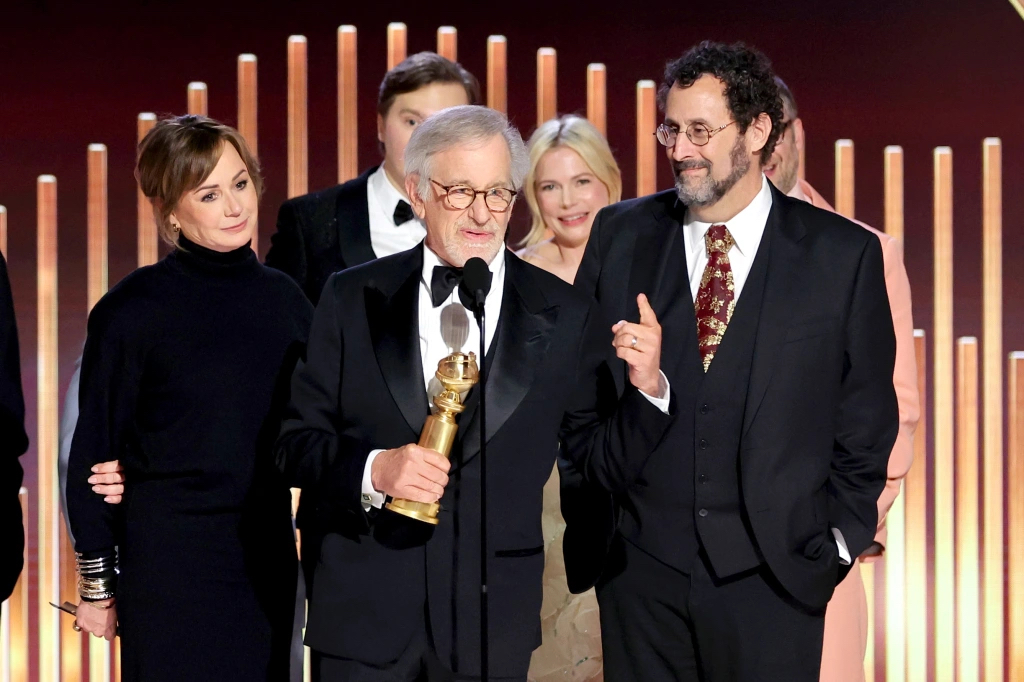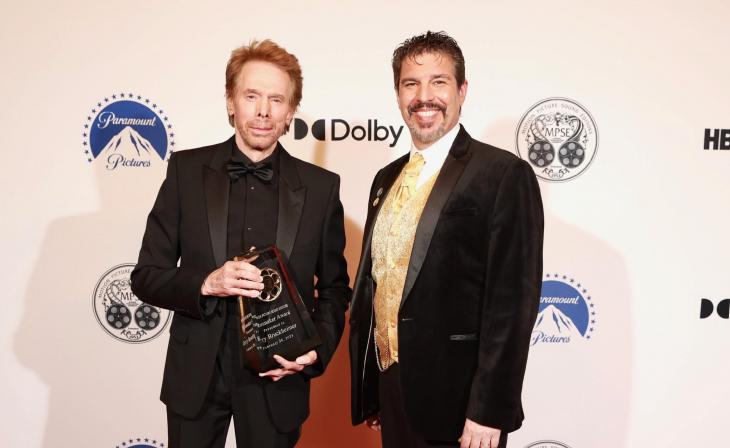Where Does Hollywood’s Endless Awards Season Fit In a Streaming Future? (Bloom)
What's going to happen now that broadcast ratings for showbiz kudos events are way down, but Netflix is eagerly latching on, anyway? Next TV's David Bloom spent a glamorous, star-studded evening at the Motion Picture Sound Editor's 'Golden Reel Awards' to find out

The smarter way to stay on top of the streaming and OTT industry. Sign up below.
You are now subscribed
Your newsletter sign-up was successful
It can be easy to forget that, as the streaming-video business stumbles through its difficult adolescent years, big chunks of the industry are still doing stuff the old way.
Take the showbiz awards season … please. The endless procession of awards shows and promotion, for both personal and project purposes, blessedly ends in less than two weeks with the March 12 Oscar telecast, the reason for much of the season and still one of traditional TV’s most watched shows.
With final Oscar voting starting Thursday, this past weekend saw four, count ‘em, four awards shows across two over-scheduled days in Los Angeles, including honors from the professional guilds/unions representing the producers on Saturday and the actors and sound editors on Sunday. The NAACP Image Awards also ran Saturday.
Notably, the weekend also featured the first live awards telecast by Netflix, which carried this year’s proceedings Sunday through its YouTube channel, weeks after announcing a deal with the actors union for its celebrity-stuffed awards for film and TV.
Next year, we’re promised, Netflix will do the ‘do in a more traditional way, on its own service, as it builds its chops as both a live video provider and a partially ad-supported one.
Where that goes will be of interest to watch in Netflix’s continuing evolution. The YouTube feed also meant a lack of need to censor F-bombs, run ads, or play off beloved honorees with an orchestra 45 seconds after touching the stage. It made for a refreshingly different show from the typical broadcast or even cable event.
If Netflix does have advertisers for next year’s show, does that mean we also get back the censorship and orchestra play-outs? Or does streaming somehow make it all better, looser and more fun, like the Golden Globes minus years of scandal?
The smarter way to stay on top of the streaming and OTT industry. Sign up below.
On Sunday night, meanwhile, I attended the other show, the 70th(!) Golden Reel Awards from the Motion Picture Sound Editors, at the 96-year-old Wilshire Ebell Theater in Los Angeles.
Despite the organization’s quaint name, its awards also honored audio geniuses for their work in TV, “non-theatrical,” animation, video games and other platforms (three Netflix projects – Drive to Survive; Guillermo del Toro’s Pinocchio; Love, Sex + Robots – were among the winners).
The projects being honored are pretty much all top notch, with many repeat Oscar and Golden Reel winners among the nominated artisans. But, despite the fact that the nominees all work in sound, no one outside the business has heard of any of them.
My reason for being there was loosely tied to the night’s one honoree whom people may have heard of, Jerry Bruckheimer. Though Bruckheimer is a slightly built, soft-spoken, behind-the-scenes executive, you’ve almost certainly heard of the projects he has produced, including $12 billion worth of hit movies (Pirates of the Caribbean, National Treasure franchises) and 2,000 hours of TV (CSI and The Amazing Race franchises).
The proximate reason for Bruckheimer’s presence at the MPSE event was to receive the Filmmaker Award. And that was in part because he’s executive producer of Top Gun: Maverick, 2022’s highest grossing movie and the source of Bruckheimer’s only Oscar nomination in his storied career, for Best Picture.
TG:M director Joseph Kosinski made a lengthy and adoring introduction, followed by a video homage from star and fellow executive producer Tom Cruise, who said he had to go to Italy for filming. Cruise, it’s worth noting, had physically attended the Producers Guild Awards the previous night, to receive the David O. Selznick Award for his work as a producer.
Even the SAG Awards contributed to TG:M’s awards-season push, giving Top Gun: Maverick the stunt ensemble award, effectively honoring Cruise, who insisted all of his film’s actors learn how to fly jet planes and do their own stunt work.
The timing on the multiple guild awards was all about one thing: boost Oscar chances for Top Gun: Maverick. The campaigning has been going on for months, driven by Cruise’s implacable support for theaters over streaming. He pushed Paramount to delay the project’s release during the pandemic’s early days, and once it finally came to theaters, to stay there, only, for most of the rest of 2022.
The decision paid off big, grossing nearly $1.5 billion from theaters worldwide since May, not debuting on Paramount Plus until Christmas week.
That led Steven Spielberg, whose The Fabelmans is also contending for Best Picture, to publicly thank Cruise at the Oscar nominees luncheon last month because he “saved Hollywood’s ass and you might have saved theatrical distribution.”
The film has had an equally hefty run in streaming, becoming Paramount Plus’ most streamed premiere ever. It even boosted viewership of the original Top Gun by 400%, and the films of Cruise’s other Paramount franchise, Mission: Impossible, by 140%, Paramount said. It’s even helped inform Paramount Global’s evolving feature-release strategy.
“The runaway success of this film across theatrical, digital and now in streaming is an undeniable proof point demonstrating the power of Paramount’s multi-platform release strategy,” Paramount Plus/Paramount Pictures top exec Brian Robbins said in a release. “Across all our 2022 titles, and now with Top Gun: Maverick, our studio has unlocked the value of variable windowing that streaming provides to augment a film’s overall success.”
Cruise remains a hard-core advocate for the theatrical experience, but Bruckheimer doesn’t have the same compunctions. Bruckheimer’s latest project is for Disney Plus, Young Woman and the Sea, with Daisy Ridley, about Trudy Ederle, who in 1926 became the first woman to swim across the English Channel.
The event, and the weekend, left me musing about where awards shows go from here. They’ve been one of the reliable fixtures on broadcast and cable schedules for decades, usually timed to ratings sweeps months. And like the rest of legacy TV, ratings have been slowly eroding.
For the revived Golden Globes in January, ratings dropped more than a quarter from its last on-air installment, while the Grammies actually bounced up 30% on CBS. The 12.4 million Grammy viewers were the most since before the pandemic, though admittedly a long way from 2012’s 39 million U.S. viewers.
But still, there’s an audience there, especially for awards shows involving projects, stars and musical creators who are themselves global brands. The Grammys and Oscars should benefit from a hybrid approach that reaches what’s left of broadcast’s big audiences, while slowly building a new streaming audience. But the cable collapse suggests looming challenges for second- or third-tier televised shows. Can they find any purchase in streaming? That seems less of a sure thing.
Certainly, the Golden Globes and its parent organizations are hoping so. Big stars largely seem to have put aside their issues; It is a mainstay of Awards Season after all. But there’s no word yet about where the show may land next year, though the date has already been set for Jan. 7.
And for something like the MPSE’s Golden Reel Awards, could they ever become a streaming show? The event itself featured plenty of people in black ties and/or glittery gowns, with the requisite occasionally impassioned thank-you speeches, an expert and consistently funny emcee in Patton Oswalt, and a historic location.
Maybe Spotify should give the sound editors a call. I’ve heard they care a bit about audio programming.
David Bloom of Words & Deeds Media is a Santa Monica, Calif.-based writer, podcaster, and consultant focused on the transformative collision of technology, media and entertainment. Bloom is a senior contributor to numerous publications, and producer/host of the Bloom in Tech podcast. He has taught digital media at USC School of Cinematic Arts, and guest lectures regularly at numerous other universities. Bloom formerly worked for Variety, Deadline, Red Herring, and the Los Angeles Daily News, among other publications; was VP of corporate communications at MGM; and was associate dean and chief communications officer at the USC Marshall School of Business. Bloom graduated with honors from the University of Missouri School of Journalism.



